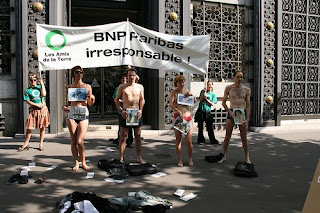French banks pushed for transparency Now the banks find themselves obliged by law to report their activities in tax havens ... The financial crisis has indeed revealed the importance of these activities in those jurisdictions where financial speculation or other lending activities are not constrained by the same rules as in other countries. Alternatives Economiques announced in March that the BNP Paribas for example had 189 subsidiaries in tax havens including not less than 27 only for the Cayman Islands: is it really to conquer the market for these small islands?
After long game of hide and seek with the government who supports them financially, it is ultimately driven by the Parliament that French banks will be required to more transparency. The amendment slipped into the bill to merge the Banque Populaire and Caisse d'Epargne is however not very accurate, except that they should explain the nature of their activities in tax havens in the Annex their annual reports every year. It is the ministerial order to determine the exact scope final information they should provide ... to be continued on the long road to transparency. France has still not forbidden, as is already the UK, the application of this principle of reporting by country multinationals. 
Subjected to increasing pressure since the outbreak of the crisis, French banks will raise part of the veil on their activities in tax havens, an obligation that France would like to generalize in the next G20.
Since the vote on the Merger Act Caisse d'Epargne, Banque Populaire last week, schools French credit are legally obliged to transparency in their relationships with non-cooperative tax jurisdictions. Specifically, banks must publish an annex to their annual accounts "information" about their locations and activities in tax havens - a rare occurrence in Europe.
change is not small. Until then, they were committed to "transparency" to the banking commission, the national supervisor, but not to the public. According
an investigation of Alternatives Economiques in April, BNP Paribas, Credit Agricole and Societe Generale, the three most affected, totaling 361 offshore entities, although French banks are much less in tax havens as their counterparts, particularly British.
NGO side, the news is welcomed. "This may send a signal to the entire economic sector and have a leading role" in the fight against tax havens, welcomes Maylis Labusquiere Oxfam France, which believes that "self-regulation is not enough."
Chairman of Transparency International France, Daniel Lebegue welcomes a "symbol" that can have a "deterrent", while reiterating that "it is not to condemn the presence of banks in these territories, "which is not illegal.
This new provision reflects more generally the increased pressure of government. Friday, Budget Minister Eric Woerth has estimated that the relationship between banks in tax havens asked" clarification ". In April, President Nicolas Sarkozy himself had demanded that credit institutions are" copies "on the subject.
central points of the device, however, remain unresolved. The nature of information that banks will still unveil uncertain and must be specified by order of the Ministry of Economy. "The scope" of the information concerned "Will be decisive," said a source familiar with the matter.
The "Mr. havens" Government is ambitious According to François d'Aubert, interministerial delegate for the fight against uncooperative jurisdictions, the law should force banks to publish their location
"country by country" and not large area could include tax havens. According to him, banks should also be required to describe their activity in terms of offshore deposits, revenues, results and business (private banking, investment, retail, ...). According
Daniel Lebegue, institutions should also indicate how they control the "risks" to such territories, including the ability to see transit of dirty money.
Questioned by AFP, the French Banking Federation was unable to immediately comment. "The banks fear that such a requirement would create problems of competitiveness" relative to their competitors, says Mr d'Aubert.
Meanwhile, the government hopes to extend this obligation of transparency to all the G20 at the upcoming summit in late September. "We are currently to submit proposals to our partners, "says one at Bercy.
Source: The Point (
http://www.lepoint.fr/actualites-economie/2009-06-16/paradis-fiscaux-les -banques-francaises-poussees-a-la-transparence/916/0/352947 )
 It is commonly accepted that 10 000 to 12 000 billion (7 130-8 555 billion euros) in annual average pass by the various tax havens around the world.
It is commonly accepted that 10 000 to 12 000 billion (7 130-8 555 billion euros) in annual average pass by the various tax havens around the world. 


.jpg)

